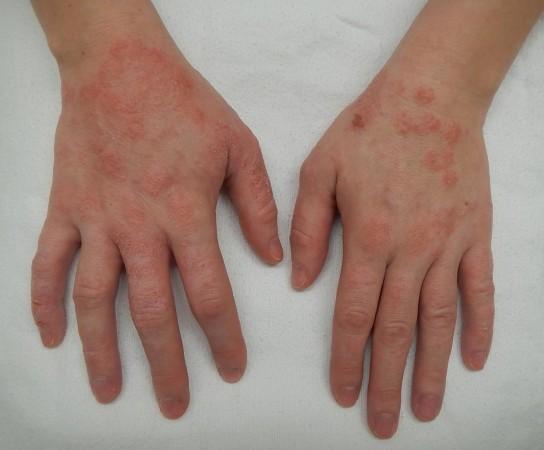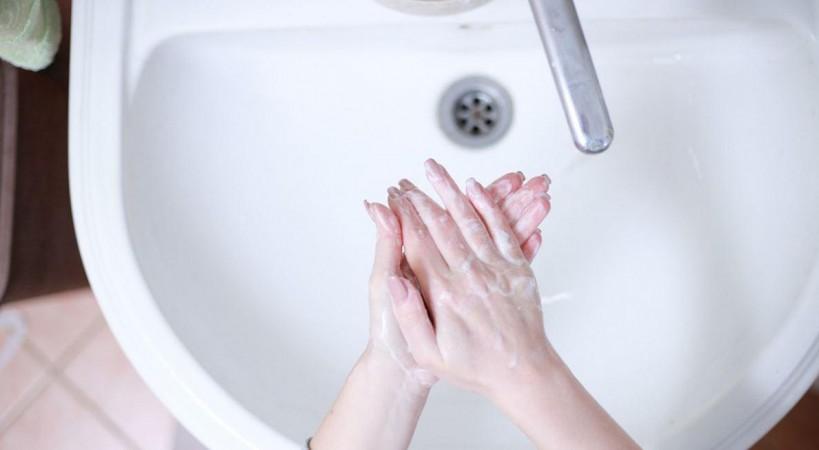"Wash your hands regularly" and "Use hand sanitizer" have become essential hygiene mantras since the beginning of the COVID-19 pandemic. While the role of these practices in keeping the SARS-CoV-2 coronavirus at bay is undeniable, they have also taken a dermatological toll on the hands. Now, a new study states that strict hand hygiene measures have led to the development of hand dermatitis in two-thirds of the public.
According to the study by scientists from Father Muller Medical College, India, the practices of handwashing and sanitizer use were found to have caused hand dermatitis in healthy participants, most of whom reported not having any prior history of the condition. The findings of the research were presented at the EADV Spring Symposium 2021.
"This research shows there is now a skin-disease epidemic within the COVID-19 pandemic. It is promising to see this problem being recognised, and I am excited to see how the dermatology community goes about finding potential solutions to this issue," said Prof. Marie-Aleth Richard, EADV Board Member, in a statement.
Hurting the Skin

Dermatitis is a broad term used to describe conditions that cause irritation and inflammation of the skin. It has several causes and forms. Some of the common causes of dermatitis are allergies, contact with irritants, infections, and an overactive immune system. Manifestations of the condition include blisters, rashes, swelling, itching, redness, and dry and ruptured skin, among others.
They can affect any part of the body's exterior that is covered in skin. Seborrheic dermatitis (dandruff), atopic dermatitis (eczema), dyshidrotic dermatitis (dyshidrosis ) and contact dermatitis are a few examples.
As hand hygiene is one of the first lines of defense against the SARS-CoV-2 virus, handwashing and use of alcohol-based sanitizers have seen an exponential increase among both the general public and healthcare professionals (HCPs). Several studies from across the world have linked excessive employment of hand hygiene practices during the ongoing COVID-19 pandemic to hand dermatitis. The current study adds to the growing evidence of this link, suggesting the 'silent' and parallel dermatological is developing along with COVID-19.
Measuring Dryness of Skin

The study involved 582 participants—291 healthy individuals from the general population and 291 healthcare professionals (HCPs). Their transepidermal water loss (TEWL), which is an important criterion for skin barrier function, was measured by the authors.
Through their analysis, the authors found that hand dermatitis was present in 68.7 percent of the general population and 92.6 percent HCPs. Interestingly, only 2.4 percent of the general public and approximately 3 percent of HCPs reported having a prior history of hand dermatitis. This data was acquired through self-reporting and the medical history of the participants.
Seeking Modifications to Hand Hygiene Practices
With constant sanitization being an integral need for intensive care professionals, they were found to have a higher mean TEWL of 58.2 g/m2h; which meant that they had drier skin. Higher mean TEWL was also observed among female participants (65.4 g/m2h). This was linked to higher use of alcohol-based hand rubs and washing of hands.

Dryness and skin irritation was cited as the primary hindrance to regular hand hygiene practices by general public participants (50.8 percent) and HCPs (72.1 percent). Dr. Monisha Madhumita, co-author of the study, stated that the findings of the research highlighted the impact of increased hand hygiene practices (due to the COVID-19 pandemic) on the skin health of the general population and HCPs alike.
"Moreover, we now know that using TEWL to measure skin barrier function can help us compare the efficacy of various barrier protective measures, and discover suitable modifications of hand hygiene practices and products to help prevent hand eczema. Finding suitable modifications to practices and products that may increase the accessibility of proper hand hygiene is something of vital importance to many in our community," she concluded.
Strict COVID-19 Hand Hygiene Measures Causes Two-Thirds of Public to Suffer from Hand Dermatitis: Study









